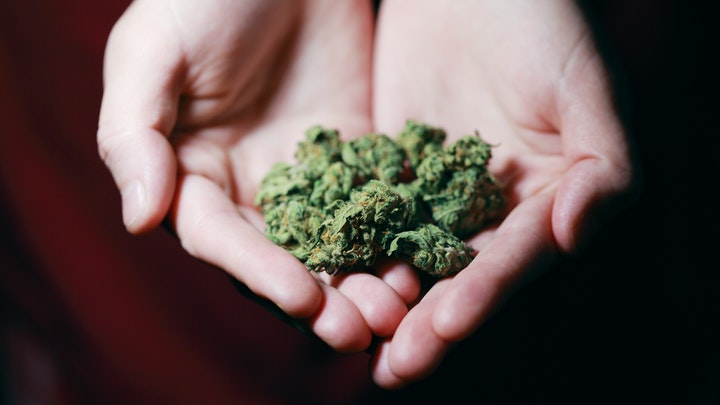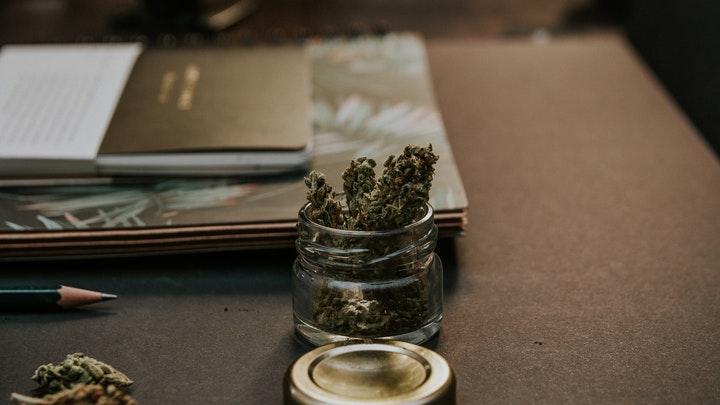Cannabis is one of the most highly abused drugs in the UK and across the rest of the world. Although addiction is more common in drugs such as heroin or cocaine, millions of people are addicted to cannabis across the world.
Cannabis is known as a gateway drug, with many people usually consuming cannabis before they move on to more severe and addictive drugs such as cocaine and heroin.
Cannabis goes by many names. For example, some people call cannabis weed, marijuana or pot. Essentially, cannabis is a plant, with leaves, flowers and stems.
It is typically smoked in a cigarette, with some other people consuming drugs in food and drinks.
Whilst a lot of people who consume cannabis on an infrequent basis do not become addicted to cannabis, others who consume cannabis on a frequent or daily basis do become heavily addicted to cannabis.
If you are addicted and dependent on cannabis, then you are said to have a cannabis use disorder, which results from chronic cannabis use [1].

Cannabis is like many other drugs, in that it affects the brain and its receptors. People who consume cannabis experience a dopamine ‘high.’ This causes people to feel temporarily happy and euphoric.
However, the more you consume cannabis the more your brain starts to undermine the way that it produces cannabis.
When this happens, people tend to start consuming more of the addictive drug in order to get the same sensation that they once felt. The more people do this, the more they become addicted to the drug.
Studies have now shown that consuming cannabis on a daily basis, or for an extended period of time changes the way your brain functions, and the chemical reaction your brain and body has to cannabis [2].
Over time, consuming and abusing the drug becomes normal, and so do the extreme highs and the extreme lows. Unfortunately, this new norm is what being addicted feels like without many people even realising it.
Lots of people stay in this cycle of abuse as they are trying to avoid dealing with their problems, trauma or issues. In an attempt to distract themselves, they consume more.
Whilst lots of people think that stopping immediately is for the best, it is often advised that people withdraw from the addictive drug and substance slowly, whilst being monitored by professionals.
Otherwise, you will experience some very nasty and painful side effects, such as intense cravings, being sick, struggling to sleep and feeling more anxious than ever.
Some people experience these withdrawal symptoms for a few days, and others experience them for up to a few weeks.
Whilst people can become addicted to cannabis at any age, you are much more likely to become addicted to cannabis if you start consuming cannabis at a young age when the brain is still evolving and adapting, which actually happens until the age of 25 years old [3].
If you start to consume cannabis at a young age, then you are also much more likely to develop a serious mental health condition, such as depression, anxiety, bi-polar disorder and schizophrenia [3].

When someone is addicted to drugs and continuously consuming them, then they will also present with some signs and symptoms. There are behavioural, physical and psychological warning signs to look out for.
First, let’s start by looking at some of the most obvious warning signs, which are usually the behavioural signs that people show. Friends and family members might be quick to pick up on these.
The behavioural warning signs usually consist of the following:
Whilst these are the main behavioural symptoms, there are also a long list of physical symptoms that show when someone is using cannabis, too.
These include:
There are also psychological symptoms that people abusing cannabis experience.
The list is as follows:

When someone withdraws from an addictive substance, they often experience withdrawal symptoms. Just as every addiction is different, every withdrawal is too.
Everyone experiences different withdrawal symptoms over a different period of time, as cannabis can stay in the body’s system for weeks after consumption.
When someone withdraws from cannabis, they might experience the following withdrawal symptoms:

If you are addicted to cannabis and want to seek treatment, then the first step to take is to talk to someone about your addiction.
You should then talk to your local GP, local drug and alcohol team or to a member of the Rehab 4 Addiction team. From there, the treatment options available will be laid out to you and the first steps to your recovery will be taken.
If you suffer from a mild to moderate addiction to cannabis, then you might be referred to outpatient rehab treatment.
This is when you will remain at home for the duration of your treatment and will visit the rehab centre on a daily or weekly basis to gain access to your treatment.
If your addiction is a bit more severe, then you will be referred to inpatient rehab treatment. This is when you will move into a rehab centre for a period of time in order to receive your treatment.
Whilst at rehab, you will receive a series of different therapy techniques in order to recover. Some of these techniques will include CBT (cognitive behavioural therapy) as well as motivational interviewing, holistic therapy and a range of other treatment techniques.
If you suffer from a mild addiction to cannabis, then you might be best suited to a home detox.
This is when you will receive your treatment in the comfort of your own home. Doctors and professionals will ring you on a daily basis to see how you are doing, and will send any medication you might need in the post.
If you’re addicted to cannabis, and it has started to interfere with your day-to-day life then you need to seek help in the form of treatment.
You might be best suited to outpatient treatment, or inpatient treatment. Whichever form of treatment you go for, your treatment plan will be best suited to your specific needs and your specific addiction.
If you want help for your addiction to cannabis, then speak to a member of the Rehab 4 Addiction team today.
Our friendly and helpful team will be able to advise you on who to talk to and what form of treatment might be best suited to you.
Speak to a member of the Rehab 4 Addiction team on 0800 140 4690 or by visiting us online at www.rehab4addiction.co.uk.
[1] Meier MH, Caspi A, Ambler A, et al. Persistent cannabis users show neuropsychological decline from childhood to midlife. Proceedings of the National Academy of Sciences. 2012;109(40):E2657-E2664. doi:10.1073/pnas.1206820109
[2] Fischer B, Russell C, Sabioni P, van den Brink W, Le Foll B, Hall W, Rehm J, Room R. Lower-risk cannabis use guidelines: A comprehensive update of evidence and recommendations. Am J Public Health 2017 Aug; 107(8):1277.
[3] Levine A, Clemenza K, Rynn M, Lieberman J. Evidence for the risks and consequences of adolescent cannabis exposure. J Am Acad Child Adolesc Psychiatry 2017 Mar;56(3):214-25.